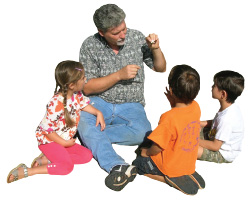 Inquiry is one of our most basic activities as human beings, beginning with babies who use it to make sense of the world around them. Partnerships with the University of Hawai‘i at Mānoa Children’s Center (UHMCC) and the Navy Hale Keiki School (NHKS) are allowing CRDG’s Carol Ann Brennan to research how inquiry is used by young children, thereby extending our understanding of how children learn in the preK years.
Inquiry is one of our most basic activities as human beings, beginning with babies who use it to make sense of the world around them. Partnerships with the University of Hawai‘i at Mānoa Children’s Center (UHMCC) and the Navy Hale Keiki School (NHKS) are allowing CRDG’s Carol Ann Brennan to research how inquiry is used by young children, thereby extending our understanding of how children learn in the preK years.
Brennan is focusing on the modes of inquiry theorized by CRDG’s Francis M. Pottenger III as they apply to young children. She is working with Jeffrey Bock at UHMCC to develop early childhood teaching strategies, including appropriate questioning techniques that promote the development of inquiry skills in young learners. They began their work by observing, identifying, and recording examples of Pottenger’s modes of inquiry as employed by young children:
• curiosity—the search for new knowledge out of an innate need to know;
• technological—the search for new knowledge in satisfaction of a need through construction, production, and testing;
• replication—the search for new knowledge through duplication of known operations;
• evaluative—the search for new knowledge about the capacity of products or actions;
• authoritative—the search for knowledge new to the seeker in established knowledge found in artifacts and people;
• mathematical—the search for new knowledge about quantity and number;
• communicative—the search for new knowledge of ways to transmit representation of things or events to others; and
• inductive—the search for new knowledge in correlated data patterns and generalizable relationships, a hypothesis-finding process.
Pottenger has described additional modes of inquiry— deductive, experimental, and theoretical—that develop in later years.
The initial research on inquiry modes fed naturally into an investigation of the role of questioning strategies teachers use to promote the development of inquiry skills. In most cases the questions used by teachers are Socratic-based. That is, teachers have some idea of where they want the questioning to lead, but they follow the child’s direction as to how they may get there. Three key questions facilitate this process:
1. What do you think?
2. How could you find out or test your idea?
3. What did you learn or find out?
Brennan and Bock determined that most of the fundamental ideas about how to develop and ask good questions with older students also apply to young learners. These include such things as asking questions on a variety of levels (simple to complex but not necessarily in hierarchical order), using wait time, and creating a safe environment where it is permissible to try out ideas and even be wrong. Results of this and previous research have been presented at National Association for the Education of Young Children (NAEYC) conferences.